AZURE WESLEYAN POETRY AZURE Poems and Selections from the Livre STPHANE MALLARM a new translation by Blake Bronson-Bartlett and Robert Fernandez WESLEYAN UNIVERSITY PRESS Middletown, Connecticut WESLEYAN UNIVERSITY PRESS Middletown CT 06459 www.wesleyan.edu/wespress 2015 Blake Bronson-Bartlett and Robert Fernandez All rights reserved Manufactured in the United States of America Designed by Richard Hendel Typeset in Garamond Premier Pro by Tseng Information Systems, Inc.
STPHANE MALLARM a new translation by Blake Bronson-Bartlett and Robert Fernandez WESLEYAN UNIVERSITY PRESS Middletown, Connecticut WESLEYAN UNIVERSITY PRESS Middletown CT 06459 www.wesleyan.edu/wespress 2015 Blake Bronson-Bartlett and Robert Fernandez All rights reserved Manufactured in the United States of America Designed by Richard Hendel Typeset in Garamond Premier Pro by Tseng Information Systems, Inc.  This project is supported in part by an award from the
This project is supported in part by an award from the
National Endowment for the Arts Library of Congress Cataloging-in-Publication Data Mallarm, Stphane, 18421898. [Poems. Selections. English] Azure: poems and selections from the Livre / Stphane Mallarm;
a new translation by Blake Bronson-Bartlett and Robert Fernandez. paper)ISBN 978-0-8195-7580-7 (pbk.: alk. paper)ISBN 978-0-8195-7581-4 (ebook) I. paper)ISBN 978-0-8195-7581-4 (ebook) I.
Bronson-Bartlett, Blake, translator. II. Fernandez, Robert, 1980 translator. III. Title. PQ2344.
A2 2015 841.8dc23 2015018017 5 4 3 2 1 Cover illustration, Stphane Mallarms signature. CONTENTS TRANSLATORS NOTE Another Mallarm It is perhaps because Mallarm is so important to modernism and twentieth-century and contemporary Continental Philosophy that English-language versions of the poets work end up inert and academic. The following questions therefore preoccupied us for some time before our labors began: Why cant the English language live up to the demands of Mallarms art? Can we make these poems live, in English, without betraying them? Can we practice the art of translation as the art of writing poetry? Or the art of reading? Azure is the record of our exploration of these questions through collaborative translation, intensive reading, and our commitment to the process of writing. Mallarm poses formidable challenges to his translators, his readers, and to poets. We found ourselves meeting these challenges with a challenge of our own. Our primary aim was to create translations that worked as contemporary poems and that linked translation to the reading and writing of poetry.
We hope to revive an interest in Mallarm the poet that rivals the interest in Mallarm the thinker of poetry. On a touch au vers The line given above in French, from Mallarms lecture Music and Letters, demonstrates the way the poets language, regardless of generic form, resists translation and demands interpretation. Take Rosemary Lloyds rendering of the line, as published in Mary Ann Cawss Mallarm in Prose: Poetry has been under attack. What Lloyds translation captures is the context in which the utterance was made: late nineteenth-century France, several decades after the death of Baudelaire, when the latter had already been canonized as a proto-symbolist hero for the subtle alterations of metrics in his masterful alexandrines (the feints of his prosody, as Walter Benjamin put it) and his posthumous Petits pomes en prose. But the overturning of poetic tradition in France after 1800 is only one aspect of the attack to which Mallarm refers. The other is the banality of poetic art after 1800, a situation parodied in Baudelaires mud-spattered poets and dying swans.
The decay of the alexandrine and the emergence of modern lyric poetry were born twins, and, true to Mallarms utterance, Lloyd captures the pair and leaves the rest to the readers of her translation. The strength of a rendering of the line carried over by a Mallarm scholar shines through here. And yet the line must leave out more than just a little of the original French to radiate with the historical significance it eloquently conveys. On a [We have/One has] touch au [touched upon/struck a blow against] vers [verse]. The tacit allusion to Baudelaires Le Soleil, where the poet go[es] out alone to practice [his] fantastical fencing, is not completely lost, though it is missed. Why? The line represents, importantly, a certain tension conveyed semantically while missing a certain tension at work in the grammar and poetic diction, a restlessness of the signifier.
The embattled position of the poet is an embattled position for the singular-plural pronoun (on): a whole society that lives in language, iterates it by way of idiomatic expression, and forgets its poetic origins as it falls into habitual, common usage. To touch upon verse, then, is to rediscover the system of measures and intervals, harmonies and dissonances, with which language beginsthe notation systems at work in music as in letters. To strike a blow is to strike a chord: either way, the practitioners skill emerges from a state of being en garde, of gaining a heightened awareness of the current context of poetic art and its historyof a sparring with that history and with those who defend their own positions, however conventional or unconventional, in languageand of, at the precise moment, in the precise place, striking. That is what, we have decided, gives Mallarm a perennial freshness: his strategic positioning and timing. To elaborate on the specifics of our approach, as well as to highlight our specific contribution to the legacy of Mallarm, we offer below a comparison of two well-known and respected translations of his verse: Henry Weinfields (University of California Press, 1994) and E. and A. M. M.
Blackmores (Oxford, 2006). For our comparison, we have selected the first four lines of the second stanza of one of Mallarms more difficult and ambitious poems, Funeral Toast. Above the four lines, the last line of the previous stanza is given in brackets for reasons that will soon be evident. The lines in French read: [Retourne vers les feux du pur soleil mortel!] Magnifique, total et solitaire, tel Tremble de sexhaler le faux orgueil des hommes. Cette foule hagarde! elle annonce: Nous sommes La triste opacit de nos spectres futurs. In the first of our four lines under consideration, the word tel is used as an indefinite pronoun, rhyming with soleil mortel (mortal sun) and, if not referring to the sun, then referring to some other masculine noun (nouns being gendered in French and tel being masculine and singular) in the poem.
This usage is exceptional in French, because tel and its variants are more commonly used as an indefinite adjective. A relatively literal translation of the lines would therefore read as follows: [Return to the fires of the pure mortal sun!] Magnificent, total and solitary, such/such a one [mortal sun, etc.] Trembles to exhale the false pride of men. This haggard crowd! it announces: We are The sad opacity of our future specters. Henry Weinfield translates the four lines as follows: [Return toward the fires of the pure mortal sun!] Magnificent, complete within itself alone, It stands as an admonition to the foolish pride of men. This haggard crowd announces: We are nothing, then, Save for the sad opaqueness of the future ghosts we bear. Weinfield has made several interesting decisions.
He captures the sense of Mallarms pair of adjectives by transforming total and solitary into complete within itself alone. But the phrase is strictly Weinfields, not Mallarms, for at least two reasons. Mallarm provides a triad of modifiers: Magnificent, total and solitary. What the triad amounts to, in sum, is as abstract and as speculative as Weinfields complete within itself alone. Nevertheless, the difference between the translation and the original is significant. Weinfield gives his readers a sum, while Mallarm gives his readers parts.
Weinfield achieves this effect by maintaining the first adjective and then presenting the sum of the second and third adjectives with his formulation complete within itself alone. But that phrase is not in the poem; rather, it is a free translation based on Weinfields reading of the line. Such liberties for introducing his phrase complete within itself alone. So if Weinfield has taken his liberty for its own sake, we applaud him, as we imagine that he would only have done so to carry over into English what literal translation could not. The second reason we suggest the phrase is Weinfields and not Mallarms is demonstrated in the second line from our sample four. At the end of the first line, the pronoun tel, which serves as the subject of the verb tremble (trembles, in English), has been moved to the beginning of the second line, so that subject and predicate can be read continuously on one line.
Next page
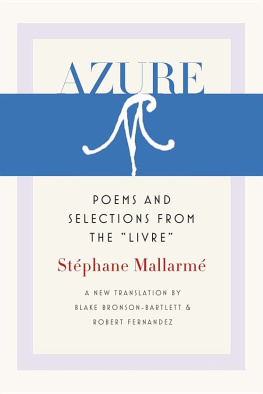


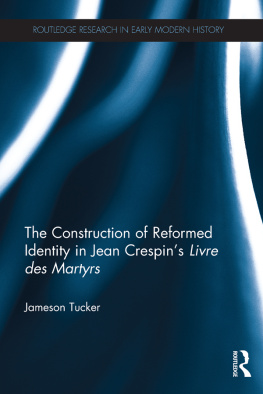
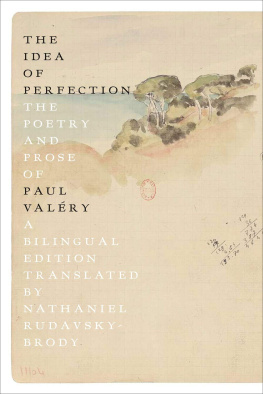

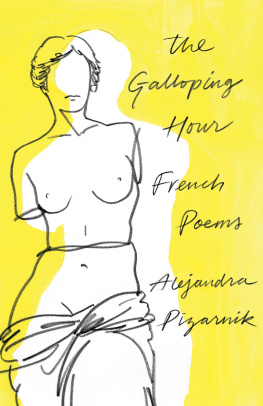


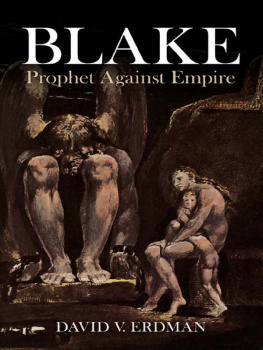
 STPHANE MALLARM a new translation by Blake Bronson-Bartlett and Robert Fernandez WESLEYAN UNIVERSITY PRESS Middletown, Connecticut WESLEYAN UNIVERSITY PRESS Middletown CT 06459 www.wesleyan.edu/wespress 2015 Blake Bronson-Bartlett and Robert Fernandez All rights reserved Manufactured in the United States of America Designed by Richard Hendel Typeset in Garamond Premier Pro by Tseng Information Systems, Inc.
STPHANE MALLARM a new translation by Blake Bronson-Bartlett and Robert Fernandez WESLEYAN UNIVERSITY PRESS Middletown, Connecticut WESLEYAN UNIVERSITY PRESS Middletown CT 06459 www.wesleyan.edu/wespress 2015 Blake Bronson-Bartlett and Robert Fernandez All rights reserved Manufactured in the United States of America Designed by Richard Hendel Typeset in Garamond Premier Pro by Tseng Information Systems, Inc.  This project is supported in part by an award from the
This project is supported in part by an award from the